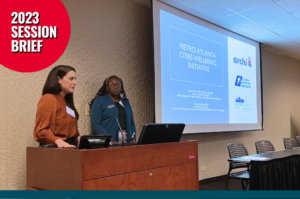By Gracie Banks
 After noticing an increase in falls among older residents, the city of Decatur developed a program to increase physical activity among older adults. College Park started a project focused on addressing food deserts within their city. These are just two out of the programs that emerged from the Metro Atlanta Cities Wellbeing Initiative (MACWI).
After noticing an increase in falls among older residents, the city of Decatur developed a program to increase physical activity among older adults. College Park started a project focused on addressing food deserts within their city. These are just two out of the programs that emerged from the Metro Atlanta Cities Wellbeing Initiative (MACWI).
The Metro Atlanta Cities Wellbeing Initiative empowers city leaders throughout Georgia to make data-driven decisions that correspond to their city’s specific needs. A session describing MAWCI’s work was held at the 12th Annual State of the Public Health Conference on Thursday, October 26th, at the University of Georgia.
Public health professionals Rebecca Baskam and Carrie Oliver shared how the initiative was developed and implemented.
Oliver, a Senior Innovation Manager at the Atlanta Regional Collaborative for Health Improvement (ARCHI), described how city leaders can get overwhelmed by the abundance of public data. Most don’t know how to process it, collect it, or use it for action.
“The goal of the initiative was to support these city leaders, some of whom included elected officials, to really integrate data usage into their decision-making and their action planning,” Oliver said.
Each city participated in discussions regarding the specific needs of their city. Along with the city of Decatur and College Park, three other cities participated. The city of Atlanta focused on youth development. The city of East Point’s well-being initiative focused on health equity. The city of Chamblee focused on affordable housing.
“We didn’t go into the cities and say you have to do a wellbeing project, or policy action plan on this topic,” Oliver said. “Instead, it was based on self-discovery and discussion. It was a chance to elevate the issues that were most important in their own communities.”
Baskam and Oliver are looking for opportunities to share and continue their work. They are discussing wellbeing work with other cities to increase participation for the future of MACWI.
“We want to be a model for what this programming could really be for other city leaders,” Oliver said.
